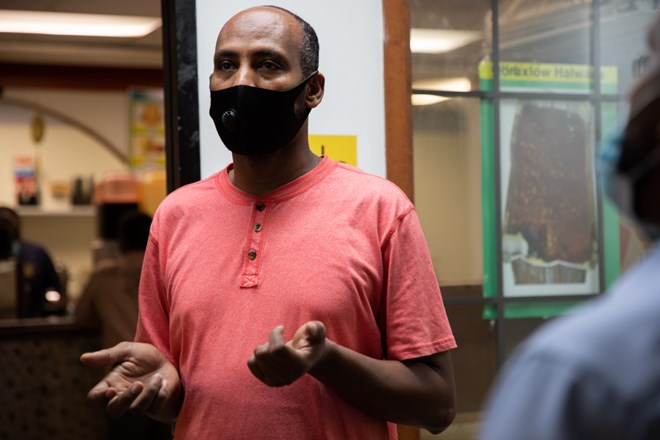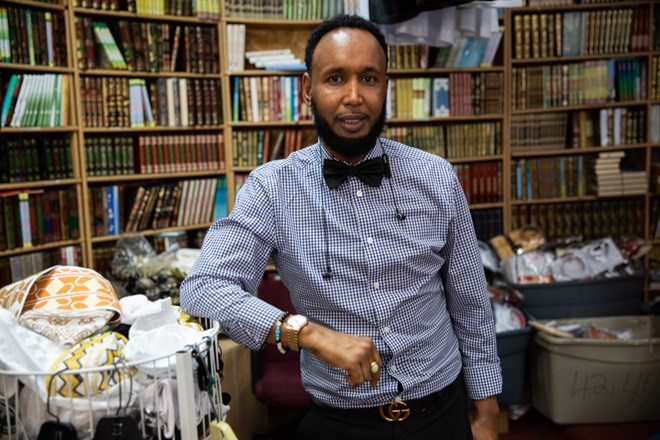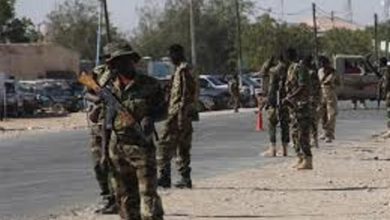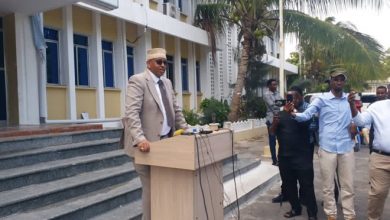Minnesota is helping malls that serve immigrant communities survive the COVID-19 downturn. How much aid will their tenants see?
Now that the state of Minnesota has set aside grants to help malls that serve immigrant communities weather the economic downturn caused by the COVID-19 pandemic, the next big question is who sees the biggest benefit – mall owners, or individual merchants.
Now that the state of Minnesota has set aside grants to help malls that serve immigrant communities weather the economic downturn caused by the COVID-19 pandemic, the next big question is who sees the biggest benefit – mall owners, or individual merchants.
Governor Tim Walz pledged “unwavering” support Monday to an eager crowd of East African shop owners at Karmel Mall in Minneapolis who’ve been struggling to maintain their businesses since the start of the pandemic.
Two days later, the state announced a plan that will award one-time grants to several of these businesses. A dozen small malls in Minnesota will get $2.5 million in grants from the state Department of Employment and Economic Development.
The grants, which will be awarded to 11 malls in the Twin Cities and one mall in St. Cloud, all of which serve African, Asian, and Latino immigrant communities. They come as part of a $62.5 million COVID-19 relief package passed by the state Legislature in a special session earlier this summer.
The grant total ranges from $110,000 to $250,000 for each mall, which altogether house more than 1,150 tenants. Several tenants interviewed Thursday said they were struggling just to stay in business, and wondered whether the grants would benefit them.
Hamse Warfa, DEED’s deputy commissioner for workforce development, said the grants are important because many of the malls’ businesses and storefronts were unable to get federal COVID-19 relief aid earlier during the pandemic. Hamse, who is the highest-ranking African immigrant in state government, said most of the grant money will go to expenses like covering one month’s rent for the vendors. This may break down to around a few hundred dollars for each shop.
“While the amount is small, it’s a good start,” Hamse said.
He emphasized that more legislative action on the issue is needed.

Somali 24 Mall café Nogob Coffee owner Abdirazaq Olaad says business is down 50 percent compared to before the pandemic. Credit: Jaida Grey Eagle | Sahan Journal
Among the malls selected, Hmong Village Shopping Center on St. Paul’s East Side is slated to get $250,000 through the grant. Thomas Herr, Hmong Village’s general manager, said the money would mostly go toward vendor rent payments. Herr said the mall will keep some of the money to make up for the three months of rent the mall charged at half-price during the beginning of the pandemic.
“I know this is a very difficult time, not just for Hmong Village but for all of the nation,” Herr said. “We can’t thank the governor and the Legislature enough for thinking of us.”
At 24 Somali Mall in south Minneapolis on Thursday afternoon, some shop owners expressed anxiety over whether the state grants would trickle down to them. Abdirazaq Olaad, who has owned and run the mall’s Nogob Coffee restaurant for the past decade, said he’s waiting for the mall’s owner to decide how to use its $250,000 grant.
Nogob pays about $3,000 per month to rent its space and normally makes about $150,000 per year in revenue, he said. But business has been down 50 percent since the pandemic began, and that’s after shutting the restaurant down completely on March 18 and reopening in June.
Abdirazaq has been able to access loans like the federal Paycheck Protection Program to stay afloat, but he said he needs more support to make it through the pandemic. His business depends on daily customers, and Abdirazaq pointed to the sparse number in his shop.
“If we just continue like this, we will not be able to afford our bills,” Abdirazaq said.
Ahmed Firin, who for 20 years has sold Islamic books and clothes at the mall’s Tawakal & Bookstore, said he wasn’t able to access the PPP loan because he is self-employed rather than registered as a business. Several of his peers couldn’t access federal loans for similar reasons.
Ahmed said that the owner of the mall should not keep the state grant money, but instead give it to the vendors and charge them their normal rent. Ahmed said he was concerned that the owner would keep the money to reimburse for the 50 percent and 25 percent monthly rent discounts he gave to all tenants in April and May, respectively.
“The grant should go straight to the businesses, not to him,” he said.

Ahmed Firin, who runs Tawakal & Bookstore at 24 Somali Mall, said he wasn’t able to access a federal PPP loan because he is self-employed. Credit: Jaida Grey Eagle | Sahan Journal
When Ahmed said he talked to the mall’s owner about how the grant would be distributed, he got a response: the mall hasn’t received the money yet.
The malls receiving the state DEED grants are:
—24 Mall/Village Market, Minneapolis: $250,000
—Al Karama Mall, Minneapolis: $187,500
—Global Center, St. Cloud: $110,000
—Hmong Village Shopping Center, St. Paul: $250,000
—Hmongtown Marketplace, St. Paul: $250,000
—JigJiga Business Center/Plaza Verde, Minneapolis: $117,500
—Karmel Mall, Minneapolis: $250,000
—Madina Management Group, Minneapolis: $177,500
—Mercado Central, Minneapolis, $250,000
—Midtown Global Market, Minneapolis, $250,000
—Plaza Mexico, Minneapolis, $250,000
—Riverside Mall, Minneapolis, $157,500





